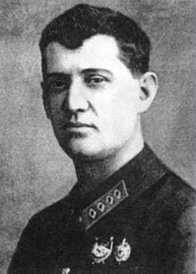Stanislaw Franzewitsch speaking
Stanislav Redens ( Russian Станислав Францевич Реденс ., Scientific transliteration Stanislav Francevič speaking , Polish Stanislaw Francewicz phrases ; born May 5, jul. / 17th May 1892 greg. In Nowominsk , Governorate of Lomza , Russian Empire , today Minsk Mazowiecki, Poland ; † January 21st 1940 in Moscow ) was a Soviet intelligence - officer of Polish descent and brother Stalin.
Life
Before the First World War , Redens worked in a metal factory in Kamenskoye , and in 1914 he joined the social democratic RSDRP . Initially mobilized, he was discharged from the army in 1915 due to illness . In 1917 he was secretary of the metal workers' union of the RSDRP, more precisely the associated SDKPiL (Social Democrats of Poland and Lithuania) under Leo Jogiches .
Redens was sent to Moscow from Ukraine in 1918 and appointed inspector of the Cheka . Soon afterwards he was secretary of the Presidium of the United Cheka under Dzerzhinsky - both knew each other from their work in the SDKPiL, of which Dzerzhinsky was a co-founder.
At the second marriage of Stalin on March 24, 1919, Redens, as Stalin's future brother-in-law, was the best man of the bride Nadezhda Alliluyeva . He was married to her sister Anna Alliluyeva. During the civil war there was talk in Odessa , Kiev and Kharkov . At the end of 1920 he was involved as a Cheka functionary when the Bolsheviks took the Crimea , evacuated by the White Army under Wrangel . Entrusted with internal administrative tasks in 1921, Redens was again head of the Cheka in the Crimea on September 11, 1922 and remained so when it became the Autonomous Socialist Soviet Republic in 1923 . In June 1926 he was called to Moscow. From 1927 to 1934 he was a member of the Central Committee of the CPSU and from 1934 the Central Revision Commission.
Redens was head of the Transcaucasian GPU from November 10, 1928, with Lavrenti Beria as Georgia's party secretary . At a nightly celebration in the Berias house in Tbilisi in 1931 , he is said to have drunk a scene that Beria used to write a denunciating letter to Stalin. Redens was then transferred to Belarus as head of the GPU on May 17, 1931 and to Ukraine on July 25 , while Beria also took over his position in Georgia. In 1932 he and Kossior were given the task of developing a plan (as part of the forced collectivization ) to liquidate the " kulaks and the Petlyur counter-revolutionaries". In the course of the deculakization , Redens belonged to a troika that decided the fate of those people who were considered kulaks. Two thousand kolkhoz chairmen were arrested and the great Ukrainian famine of 1932/33 ( Holodomor ) developed. When the grain quota was not reached in January 1933, Redens was replaced in the Ukraine.
From 1933 to 1937 Redens was head of the GPU or NKVD of the Moscow district under Nikolai Yezhov . In 1934, after the assassination of Kirov, he led the campaign to “purify Moscow from opposition and non-proletarian elements”. On November 26, 1935, he was appointed investigator of the first degree. In 1937 Redens was again a member of a troika, this time of the Moscow Express Court for the implementation of NKVD order No. 00447 . At the height of his career, he was a member of the Supreme Court of the USSR in 1937 .
From January 1938 until his arrest on November 22nd, he was People's Commissar for Internal Affairs in Kazakhstan . Redens was sentenced to death as a "member of the Polish Diversions espionage group" on January 21, 1940 and shot . According to the memories of Nikita Khrushchev , Redens was severely addicted to alcohol . In 1961 he was rehabilitated.
After his execution, Redens' family with their two sons Leonid and Vladimir received a large apartment in the so-called house on the embankment opposite the Kremlin on the banks of the Moscow River and privileged care. Redens' wife Anna had been a party member since 1917 and worked for the Central Committee in Odessa during the civil war. In 1948 she was sentenced to 10 years in a camp for alleged espionage . She had written her memoirs, the publication of which Stalin did not approve. After Stalin's death she was released in 1954 and died in 1964. According to her son Leonid, she went insane.
literature
- Roy Medvedev : The Judgment of History , Volume 2; Berlin: Dietz-Verlag, 1992
Web links
| personal data | |
|---|---|
| SURNAME | Talking about, Stanislaw Franzewitsch |
| ALTERNATIVE NAMES | Реденс, Станислав Францевич |
| BRIEF DESCRIPTION | soviet politician |
| DATE OF BIRTH | May 17, 1892 |
| PLACE OF BIRTH | Nowominsk , Łomża Governorate , Russian Empire , today Mińsk Mazowiecki, Poland |
| DATE OF DEATH | January 21, 1940 |
| Place of death | Moscow |
